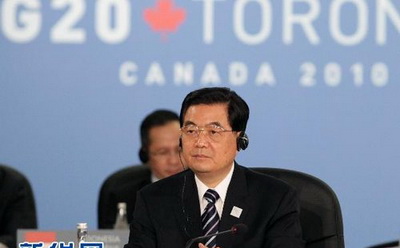China at the G20 Meeting in Toronto

The G20 summit closed in Toronto, Canada on Sunday with Chinese President Hu Jintao coming away a winner. China has faced criticism from other nations for allegedly artificially pegging the yuan to the U.S. dollar. However, with the recent announcement that the yuan will be allowed to rise against the U.S. dollar, China was able to deflect criticism at the meeting.
Leading up to the summit, senior Chinese officials warned that “finger-pointing” would undermine the objectives that world leaders had set out for the meeting. Their message seems to have gotten through as, prior to the arrival of the world leaders in Toronto, a senior Canadian official urged other members of the G20 not to exert too much direct pressure on China and to stay focused on the primary issue which is to reform the financial regulatory system.
With this issue taking most of the attention of participants, China may have taken advantage of opposition to the proposed “bank tax” that the U.S. and Europe were in favor of.
Canada had been very vocal in its opposition to the “bank tax” and did not want any distractions to take away from its counter-proposal. This proposal focused instead on enforcing tougher standards on banking capital. In order to successfully push this plan through however, they needed the support of developing nations like China and India.
China’s primary interest, international financial institution reform, was, in turn, given a boost with Canada expressing its support for international financial institutions that "better reflect the emerging economies of the world".
With China expected to surpass Japan as the world’s second largest economy this year, the transference of voting shares in the International Monetary Fund (IMF) is a hot issue that will be decided later this year at the G20 summit to be held in South Korea.
China believes that the current structure is biased too heavily in favor of Europe and the United States and excludes rapidly growing, developing nations.
European countries that are facing the prospect of losing some of their clout as their voting share is diluted, are offering up stiff resistance to the idea of reform.
China currently has the sixth largest share at 3.7% compared to the United States’ 17%.
While China earned praise for its intention to increase its exchange rate flexibility before the summit even began, it scored another victory in the final moments of the summit by having a line removed from the final G20 statement signed by world leaders.
The line stated that Beijing would end its pegging of the yuan to the U.S. dollar, but Chinese officials requested it be removed as they consider it a sovereign issue that has no place in an international forum. As a result, President Hu Jintao was able to satisfy international concerns while not making any firm commitments regarding a time frame for the revaluation of the Chinese yuan.
Links and Sources
Official website of the G20 Toronto Summit: The G-20 Toronto Summit Declaration
Official website of the G20 Toronto Summit: Video of Hu Jintao's Arrival
Xinhua: Image
The views posted here belong to the commentor, and are not representative of the Economic Observer |
Related Stories
Popular
Interactive
Multimedia

- EEO.COM.CN The Economic Observer Online
- Bldg 7A, Xinghua Dongli, Dongcheng District
- Beijing 100013
- Phone: +86 (10) 6420 9024
- Copyright The Economic Observer Online 2001-2011



















